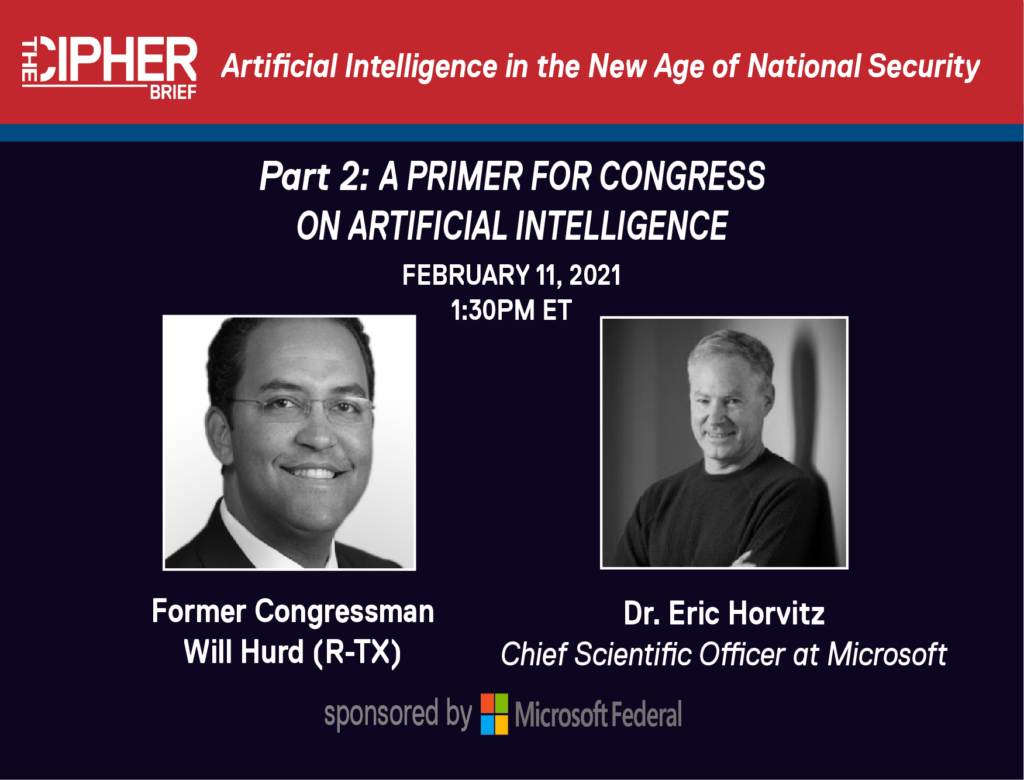A Primer for Congress on Artificial Intelligence

February 11, 2021 at 1:30pm ET
Presenting:
Artificial Intelligence in the New Age of National Security
a 6-part series
Part 2: A Primer for Congress on Artificial Intelligence
This special series of virtual web briefings will tap leading, diverse experts from government, industry, academia and finance and investment to lay out a path forward for integrating Artificial Intelligence into the US National Security infrastructure. Our goal is to bring greater attention and expertise to the issue of artificial intelligence and how it will change the nature of intelligence moving forward.
During this 6-part series, we’ll hear from a number of experts from both the public and private sectors, as both are crucial when it comes to understanding artificial intelligence, developing it, identifying gaps that need to be filled, and integrating it into US national security, intelligence collection and analysis. Register for ‘Part 2: A Primer for Congress on Artificial Intelligence,’ click here.
About the Speakers:
Will Hurd
Former Congressman (R-TX)
Will Hurd is a former member of Congress, cybersecurity executive, and undercover officer in the CIA. For almost two decades he’s been involved in the most pressing national security issues challenging the country whether it was in the back-alleys of dangerous places, boardrooms of top international businesses or halls of Congress.
After stopping terrorists, preventing Russian spies from stealing our secrets, and putting nuclear weapons proliferators out of business, Will helped build a cybersecurity company that prepared businesses for the next domain of conflict – cyberspace.
While in Congress, Texas Monthly and Politico Magazine called Will “The Future of the GOP,” because he put good policy over good politics at a time when America was often consumed with what divides us rather than what unites us. He was able to get more legislation signed into law in three terms than most congressmen do in three decades – substantive legislation like a national strategy for Artificial Intelligence.
Will is a native of San Antonio and earned a Computer Science degree from Texas A&M University. He is growing the US transatlantic partnership with Europe as a trustee of the German Marshall Fund and is serving as a fellow at the University of Chicago Institute of Politics.
Dr. Eric Horvitz
Chief Scientific Officer, Microsoft
Dr. Eric Horvitz is a technical fellow at Microsoft, where he serves as the company’s first Chief Scientific Officer. As chief scientist of the company, Dr. Horvitz provides cross-company leadership and perspectives on advances and trends on scientific matters, and on issues and opportunities rising at the intersection of technology, people, and society. He has pursued principles and applications of AI with contributions in machine learning, perception, natural language understanding, and decision making. His research centers on challenges with uses of AI amidst the complexities of the open world, including uses of probabilistic and decision-theoretic representations for reasoning and action, models of bounded rationality, and human-AI complementarity and coordination.
His efforts and collaborations have led to fielded systems in healthcare, transportation, ecommerce, operating systems, and aerospace. He received the Feigenbaum Prize and the Allen Newell Prize for contributions to AI. He received the CHI Academy honor for his work at the intersection of AI and human-computer interaction. He has been elected fellow of the National Academy of Engineering (NAE), the Association of Computing Machinery (ACM), Association for the Advancement of AI (AAAI), the American Association for the Advancement of Science (AAAS), the American Academy of Arts and Sciences, and the American Philosophical Society. He has served as president of the AAAI, and on advisory committees for the National Science Foundation, National Institutes of Health, President’s Council of Advisors on Science and Technology, DARPA, and the Allen Institute for AI.
Beyond technical work, he has pursued efforts and studies on the influences of AI on people and society, including issues around ethics, law, and safety. He chairs Microsoft’s Aether committee on AI, effects, and ethics in engineering and research. He established the One Hundred Year Study on AI at Stanford University and co-founded the Partnership on AI.
Eric received PhD and MD degrees at Stanford University. Previously, he served as director of Microsoft Research Labs, including research centers in Redmond, Washington, Cambridge, Massachusetts, New York, New York, Montreal, Canada, Cambridge, UK, and Bangalore, India. He also ran the Microsoft Research Lab in Redmond, Washington.
This virtual briefing is sponsored by


